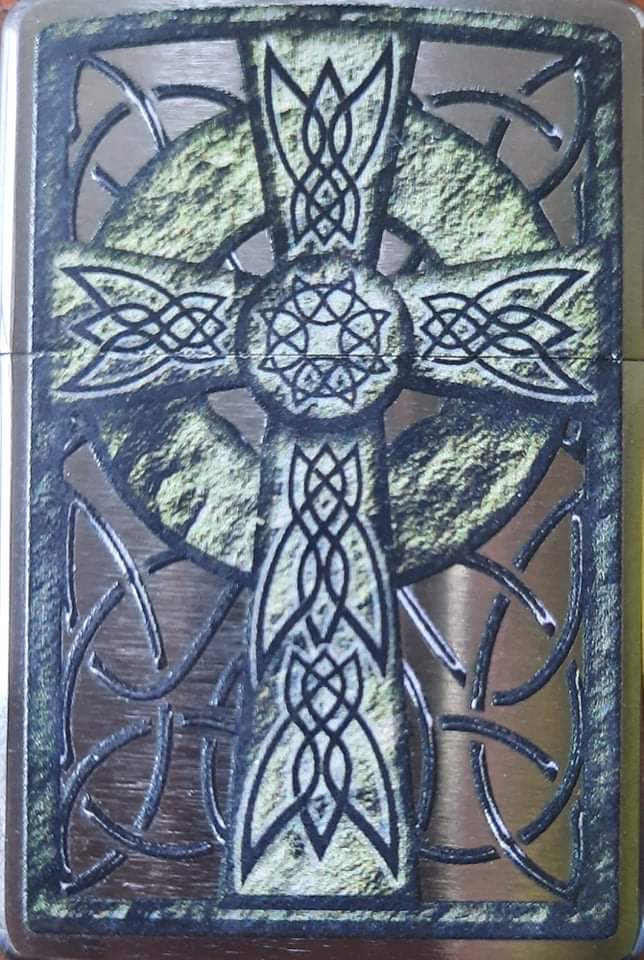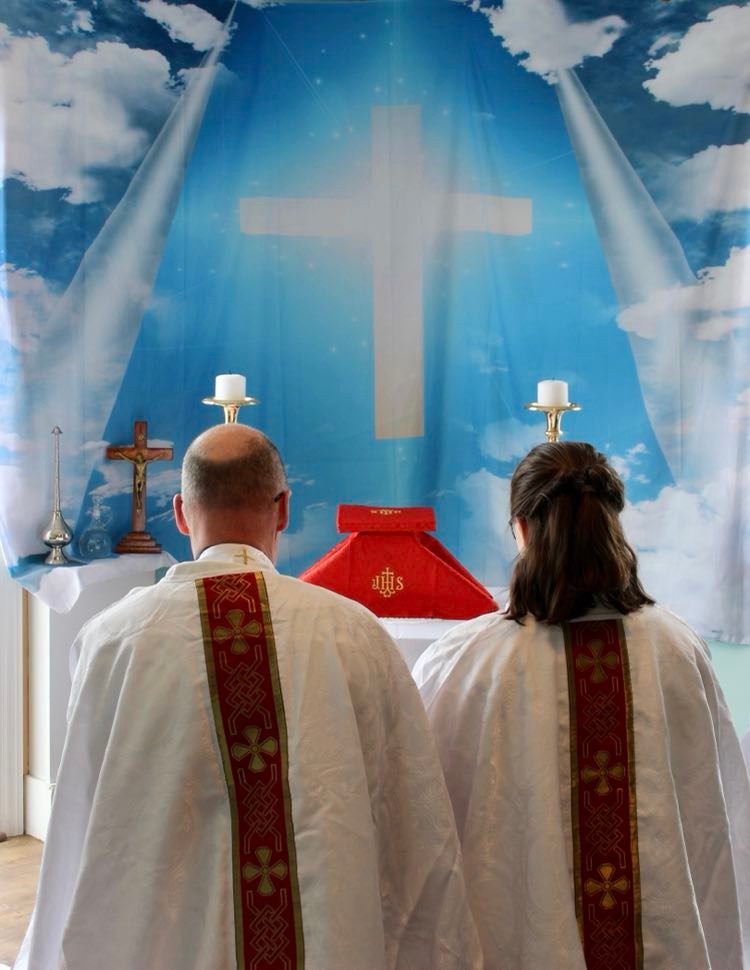- Home
- Seminary Studies
- Catholic Eschatology
Simply Catholic and Welcoming You
Catholic Eschatology

An Old Celtic Cross of a Type Often Used as a Grave Marker or Headstone
Catholic eschatology is the part of theology concerned with death, judgment and the final destiny of the soul and of humankind.
There are the 4 views of eschatology each solid and bible based.
The events leading up to the return of Jesus Christ are controversial, and many Christians identify with one of four positions: Dispensational Premillennialism, Historic Premillennialism, Amillennialism (the dominant Catholic viewpoint), or Postmillennialism.
In the history of religion, the term eschatology refers to conceptions of the last things, these being the immortality of the soul, rebirth, resurrection, migration of the soul, and the end of time. These concepts also have secular parallels—for example, in the turning points of one's life and in one's understanding of death.
When that moment of our time comes there will only be the Four Last Things, Death, Judgment, Heaven, and Hell. Every revelation about the end of the world is clothed in mystery.
In general Christians believe they will have a non-physical home in Heaven, and because Christians should be aiming for Heaven, they should do all they can to please God on Earth. They will be judged by God on the good and bad deeds they have done on Earth
It is Catholic teaching that all the dead who are to be judged will rise, the wicked as well as the just, and that they will rise with the bodies they had in this life. But nothing is defined as to what is required to constitute this identity of the risen and transformed with the present body.
The Roman Catholic Church believes in the Second Coming of Christ, where all believers will be gathered together to be with him. This gathering is seen as part of the final judgment and the end of the world.
Paul encourages believers to live in holiness, knowing that they will appear before the judgment seat of Jesus Christ 1 Thess. 3:13. He also explains that the future judgment will reveal the quality of one's work 1 Cor. 3:12–15.
The best presentation of realized eschatology appears in the Gospel of John.
The Gospel of John presents an eschatology (the study of the end times) focused on the present fulfillment of God's promises, rather than a purely future-oriented view. John emphasizes that eschatological blessings like eternal life are already available to believers in this life through Jesus. The Gospel also points to future events like Christ's return and the final judgment, but these are not the primary focus of the eschatology presented in John.
John highlights that eschatological blessings like eternal life are not just promises for the future but are available now through faith in Jesus. Phrases like "remaining in the light" and "passing from death to life" suggest this realized aspect.
While emphasizing the present reality of God's grace, John also acknowledges future events like the resurrection of the dead, the judgment of the living and the dead, and the ultimate consummation of God's plan. John presents Jesus as the fulfillment of Old Testament prophecies and the eschatological climax of the biblical narrative.
John contrasts life and death, both physical and spiritual, and portrays Jesus as the one who overcomes death and gives eternal life.The Gospel uses the imagery of light and darkness to represent God's revelation and the ongoing struggle between good and evil.
John emphasizes God's love for humanity and the unity of believers in Christ, highlighting the transformative power of Jesus' teachings and example.
In some interpretations of the Gospel of John, the belief is that the coming of the Son of Man occurred at Jesus' first coming, which is why John has a realized eschatology in which Jesus is acting as judge while he is on earth, and people are judged already according to how they view Jesus.
Strictly Catholic Eschatology

Archbishop Philip and Bishop Charlene Kneel in Front of an Altar With a Large Empty Cross Above It Symbolizing The Risen Christ, Our Way to Salvation
In terms of strictly Catholic eschatology, the study of "last things," focuses on the ultimate destiny of individuals and the world, including death, judgment, heaven, hell, and the resurrection of the body. It is based on biblical texts, specifically those in the Old and New Testaments, and includes a wide range of topics like the Second Coming of Christ, the Last Judgment, and the nature of the Kingdom of God.
Catholics believe death is not the end, but a transition to eternal life. After death, individuals face a Particular Judgment, where their souls are judged based on their actions and beliefs. For those who have not fully atoned for their sins, purgatory (for Roman Catholics) is a place of purification before entering heaven. Catholics believe that all the dead, both righteous and wicked, will be resurrected with their physical bodies at the Last Judgment.
Heaven is a state of eternal bliss and communion with God, while hell is a state of eternal separation from God and suffering.
Catholics believe that Jesus will return one day, and this return is known as the Parousia or Second Coming. There will be a final judgment of all people, where the righteous will be rewarded and the wicked will be punished.
The Kingdom of God refers to both the present reign of God through Jesus Christ and the future consummation of all things in the New Heaven and New Earth.
Biblical Basis for Catholic eschatology
Catholic eschatology draws heavily from both the Old and New Testaments, including passages in the prophets, the Gospels, and the Book of Revelation.
Specifics of the Last Things
While the core doctrines of eschatology are well-defined, there are some areas where interpretation can vary, such as the timing of the Second Coming or the specific nature of heaven and hell.
Catholic eschatology does not generally believe in a literal 1000-year reign of Christ on Earth, as described in Revelation 20. Instead, it interprets this passage symbolically, with the "thousand years" representing an extended period of spiritual reign within the Church. This perspective, known as amillennialism, is the dominant view within Catholicism.
Amillennialism
Catholicism primarily adheres to amillennialism, which interprets Revelation 20:1-6 as a symbolic representation of Christ's spiritual reign in the Church, rather than a literal, physical reign on Earth for 1000 years. The "thousand years" are not viewed as a literal duration of time, but rather as a symbol of a long period or an indefinite time frame.
Amillennialists believe that Christ's reign during this period is spiritual in nature, with the Church as a continuation of Christ's reign. While amillennialists acknowledge that Christ will return at the end of time for final judgment and establish a permanent reign in a new heaven and earth, they do not believe in a prior literal reign on Earth.
Relationship to Other Christian Traditions
Catholic eschatology shares common ground with other Christian denominations, particularly in its belief in the Second Coming, resurrection, and eternal life. However, there can be differences in how specific eschatological concepts are understood, such as views on millennialism (the belief in a literal 1000-year reign of Christ on earth).
While amillennialism is the dominant view in Catholicism, other Christian perspectives, such as premillennialism, believe in a literal 1000-year reign before the end of the world.
Recent Articles
-
The Basic Catechism of the Catholic Church
Feb 12, 26 11:03 AM
A basic catechism of any rite or branch of the catholic church acts as a primary reference for teaching the faith -
The Divine Office
Feb 07, 26 11:07 AM
The Divine Office The Divine Office, also known as the Liturgy of the Hours or Opus Dei ("Work of God"), is the official, daily set of prayers of the Catholic Church -
Women Being Removed or Voided from Scriptures
Jan 17, 26 05:06 PM
The concept of women being "removed" or "voided" from scriptures refers to both the physical exclusion of female narratives in historical texts...
Boat Harbour West, Newfoundland, Canada. Cell Number 709-276-0626
Join Us Also on Our St. Brigit's Community Catholic Church Prayer group on Facebook: https://www.facebook.com/groups/324523956473448


